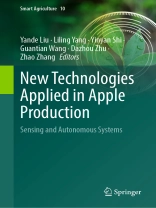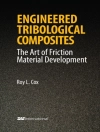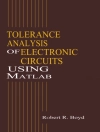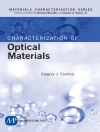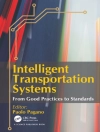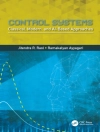This book focuses on state-of-the-art sensing and automation technologies for apple production, which provides innovative knowledge on imaging processing, AI algorithms, sensing techniques, non-destructive detection, and robotics. It falls into the area of applied science, more specifically engineering. This book, including a total of seven chapters, provides undergraduates or graduate take-away knowledge for autonomous apple production, which include but not limited to, apple harvest robotics, autonomous pollination, fruit quality detection, and postharvest infield sorting. A major innovative for this book is that it provides case studies for readers’ easy understanding. The incentive behind this book is to provide readers the latest, systematic, comprehensive new technologies for apple production.
İçerik tablosu
Lightweight and Robust YOLOv5s with Mobile Net V3 and Ghost Net for Precision Apple Flower Detection for Pollination Drones.- Apple Size Estimation Method with 3D Projection correction for In-field Grading System.- Research progress of assisted pollination technology.- Design, assembly and test of a low-cost vacuum based apple harvesting robot.- Research on the Fruit Movement Mechanism of Apple In-Field Sorting Equipment.- Research on the transferability of SSC detection models between different instruments for fresh apricots.- Research progress on key technology of apple harvesting robots in structured orchards.
Yazar hakkında
Professor Liu Yande obtained her master’s degree in photoelectric detection technology from Jiangxi Agricultural University in 2001 and her Ph.D. in Agricultural Mechanization Engineering from Zhejiang University in 2006. Since 2012, Professor Liu Yande has been serving as the Dean of the School of Mechanical and Electrical Engineering at East China Jiaotong University.
Professor Liu Yande’s primary research interest lies in the field of non-destructive photoelectric detection technology and equipment for fruits. She has presided over the completion of over 10 national-level projects. She has published over 150 papers, with 101 of them indexed in SCI/EI. She has edited 4 monographs and contributed to the compilation of 3 textbooks and has been granted 42 invention patents. She has led projects that have won 8 provincial and ministerial-level awards.
Dr. Yang is Deputy Director of the Institute of Agricultural Mechanization of Xinjiang Academy of Agricultural Sciences, Chief Expert of science and technology support of Xinjiang Characteristic Forest and Fruit Industry, and Director of Xinjiang Characteristic Forest and Fruit Machinery and Equipment Engineering Technology Research Center. She has been engaged in the research and application of forest and fruit mechanization technology and equipment.
Dr. Yinyan Shi received his B.E. and Ph.D. degree in Agrobiological Environment and Energy Engineering from Nanjing Agricultural University, Nanjing, China, in 2013 and 2018, respectively.
Dr. Shi focuses on the research of intelligent equipment and robots in agriculture. His recent research interests include: mechanization and intelligent agricultural equipment, especially in variable fertilization technology of precision agriculture, precision feeding technology of intelligent farming, non-destructive testing technology of meat quality, no-tillage seeding technology of full amount of straw, portable soil steam disinfection technology, etc. Since 2013, Dr. Shi has published 30 peer-reviewed technical papers in international journals and conferences. He is served as Reviewer of several international journals. In addition, he is employed by an agricultural machinery development company as Vice President of science and technology. He is focusing on applying and developing innovative technologies (e.g., variable-rate fertilizer and facility harvesting robots) to support precision agriculture and sustainable agriculture.
Dr. Guantian Wang received his bachelor’s degree in Mechanical Design, Manufacturing, and Automation. In 2019, he obtained his master’s degree in Mechanical Engineering from East China Jiaotong University, and he is currently pursuing a Ph.D. in Control Science and Engineering at the same university.
Dr. Wang’s main research focuses are optical non-destructive testing, machine vision, and deep learning technologies. He has been awarded the first prize for scientific and technological progress by the Chinese Instrument and Control Society and the third prize by the Chinese Mechanical Engineering Society. He has been granted five patents and holds five software copyrights. He has also received the national bronze award in the fourth China Internet+ Innovation and Entrepreneurship Competition. Additionally, he has coached students to win two national first prizes and one national third prize in science and technology competitions, as well as one provincial first prize and one provincial second prize.
Professor Dazhou Zhu graduated from the College of Food Science and Nutritional Engineering at China Agricultural University with a Doctor of Engineering degree. He has been Visiting Scholar at the Leibniz Institute of Agricultural Engineering in Germany and the University of Copenhagen in Denmark.
Professor Zhu’s main research focuses are on the detection and evaluation of the nutritional quality of agricultural products, as well as the informatization of nutrition and health. In recent years, he has participated in the construction of China’s agricultural product nutrition standard framework system. He served as Guest Editor for the special issue on ‘Nutrient-Oriented Agriculture’ in the journal ‘Chinese Agricultural Science.’ He has published more than 40 papers as the first or corresponding author, including 13 papers indexed by SCI. He has also served as the co-editor of five monographs, obtained five authorized invention patents, and registered 11 software copyrights.
Dr. Zhao Zhang received his B.E. and M.E. degrees in Industrial Engineering and Agricultural Mechanization from Northwest A&F University in 2009 and 2012, respectively, and the Ph.D. degree in Agricultural Engineering from The Pennsylvania State University, the USA, in 2015. Since November 2021, Dr. Zhang has been in College of Information and Electrical Engineering, China Agricultural University, as Professor.
